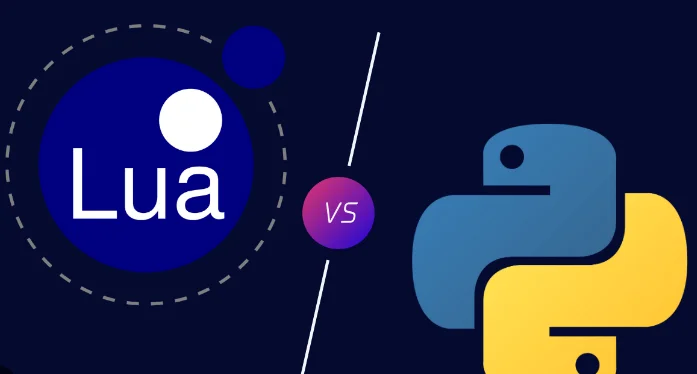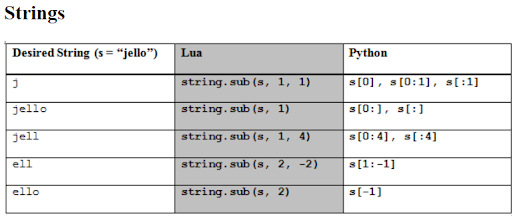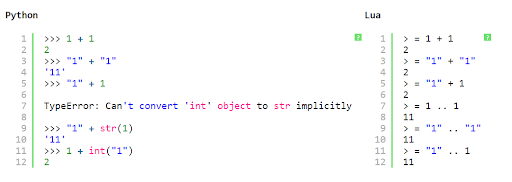
Image Source: Linkedin
Update: This article was last updated on 16th November 2023 to reflect the accuracy and up-to-date information on the page.
There are numerous programming languages available, and understanding the differences between them can be difficult. But is important to know the difference. This article will compare and contrast two popular programming languages: Python and Lua. You will be better equipped to choose the right language for your needs if you understand the differences between them.
Python and Lua, the latter of which is two years younger than the former in the world of programming languages, were created in the same decade – Python in 1991 and Lua in 1993, but they serve different purposes.
The questions of which is better and what they are used for frequently arise, and this article compares the two to resolve the confusion.
| S.No. | Table of Contents |
|---|---|
| 1. | What is Lua |
| 2. | What is Python |
| 3. | Difference Between Python and Lua |
| 4. | Python vs Lua |
| 5. | Is Lua better than Python? |
What is Lua?
Lua is a powerful embeddable scripting language that is known for its efficiency, small size, and ability to be embedded in other applications. It offers a range of programming paradigms, including procedural, object-oriented, functional, and data-driven programming, as well as support for data description.| Pros of Lua | Cons of Lua | |
|---|---|---|
| 1. | Lightweight and Simple | Limited Standard Library |
| 2. | Fast Execution Speed | Less ideal for stand-alone application |
| 3. | Easily Embeddable | Less common for web development |
| 4. | Flexible with Dynamic Typing | Less popular for general-purpose programming |
| 5. | Strong Community and Documentation | Lack of built-in multithreading |
Lua, Lua” (pronounced LOO-ah) means “Moon” in Portuguese and it was developed in Tecgraf, formerly the Computer Graphics Technology Group of PUC-Rio.
What is Python?
Python is an interpreted, high-level programming language with object-oriented and dynamic semantics. Its built-in data structures and support for dynamic typing and binding make it well-suited for rapid application development and for use as a scripting or glue language to connect different components. A Dutch programmer named Guido van Rossum developed Python. He named it after the television program Monty Python’s Flying Circus. We can say that Lua is frequently used in the development of embedded systems and virtual applications, particularly on register-based simulated machines. Python, on the other hand, is a general-purpose programming language that is widely used in both small and large projects for web development. Recommended Reading: Lua Vs Scratch: What are the Main Differences| Pros of Python | Cons of Python | |
|---|---|---|
| 1. | Clear and Readable Syntax | Slower Execution Speed |
| 2. | Vast Standard Library | Global Interpreter Lock (GIL) |
| 3. | Wide Range of Applications | Not Ideal for Mobile Development |
| 4. | Strong Community and Support | Design Restrictions in Some Paradigms |
| 5. | Great for Prototyping | Not Suitable for High-Performance Computing |
Difference between Python and Lua
Lua and Python are both widely used programming languages used for a broad range of tasks such as web development, scripting, and artificial intelligence. Here are some significant differences between the two languages:
Source: the4thwiki
Syntax: The syntax and structure of Lua and Python are distinct. In Lua, for example, function definitions do not include the word “function,” and the end keyword is used to mark the end of a block of code, whereas, in Python, indentation is used.
Source: the4thwiki
Typing: Because Lua is a dynamically typed language, variables do not have a fixed type and can change type at any time. Python is a dynamically typed language, but it also supports static typing via type hints. Performance: In terms of execution time, Lua is generally thought to be faster than Python. Python, on the other hand, has a larger standard library and a more comprehensive set of third-party libraries, which can make developing certain types of programs easier. Use cases: Lua is commonly used in game development and embedded systems, whereas Python is used in a variety of applications such as web development, scientific computing, data analysis, and machine learning. Recommended Reading: Scratch vs Python: 5 Main DifferencesPython versus Lua
| Python | Lua |
|---|---|
| Python is a free and open programming language. | Lua is free and open-source software distributed under the MIT license. |
| It is simple to read and understand, as well as powerful. | Lua is known for its simplicity, small size, and efficient performance. |
| Python does not have a specific command just to declare or create a variable. Variables are just names that refer to values. | Lua is a dynamically-typed language, which means that variables do not have a fixed type and can change type at any time. |
| Python is a multi-paradigm language that is object-oriented and procedure-oriented programming. | Lua is a multi-paradigm language with a primary focus on scripting. |
| Python is used in both small and large projects for general-purpose web applications as well as scientific computing, data analysis, and artificial intelligence. | Lua is used in register-based simulated machines and virtual applications. |
| Python does not support mobile games and applications well. | Lua is preferable for game development and as an extension language for applications. |
| Python is emerging as a popular language for data science. | Lua supports procedural, object-oriented, functional, and data-driven programming, as well as data description. |
Is Lua better than Python?

Different programming languages are designed for specific purposes, and the best language for a specific task will depend on the task’s specific requirements.
Both Lua and Python are popular programming languages with distinct advantages and disadvantages.
Lua and Python have their strengths and are suitable for different use cases. Ultimately, which language is the “best” choice will depend on your project’s specific needs and goals.
Moonpreneur understands the needs and demands this rapidly changing technological world is bringing with it for our kids and thus we are on a mission to educate and ignite the flames of entrepreneurship through our holistically created online STEM programs which will help kids master the futuristic sciences such as Robotics, Game Development, App Development, Advanced Math and much more!!
Register for a free 60-minute robotics workshop today!

















Fantastic blog post The contrast between Python and Lua was really instructive, in my opinion. It’s amazing to see how the two languages differ and how each has its own advantages. I’ve worked with Python a lot, and I find its readability and simplicity to be wonderful.
I like the thorough comparison between Python and Lua. Since I’ve been using Python for a while, learning about other programming languages is always intriguing. After reading your post, I realised that Lua’s simplicity and compactness can be useful in situations when efficiency is important. Overall, when deciding between Python and Lua, it’s crucial to take the project’s requirements into account.
Lua appears to excel in its specialised fields, such as embedded systems and gaming creation. It’s interesting to learn how lightweight Lua is and how simple it is to integrate it with other programmes. Your article gave a concise review of the advantages and disadvantages of each languages.
Which one is good for AI research/development purposes? Any opinion?
Python is more useful than Lua for AI because of its vast library, supportive community, and adaptability.
As a student of biochemistry, what programming language should I learn?
Python is highly recommended for biochemistry due to its simplicity, extensive scientific libraries, and versatility for data analysis, computational modeling, and bioinformatics tasks.
As a programmer, I have used both languages, which are good in their usage and application. Lua is faster than Python because it is lightweight and has limited libraries.